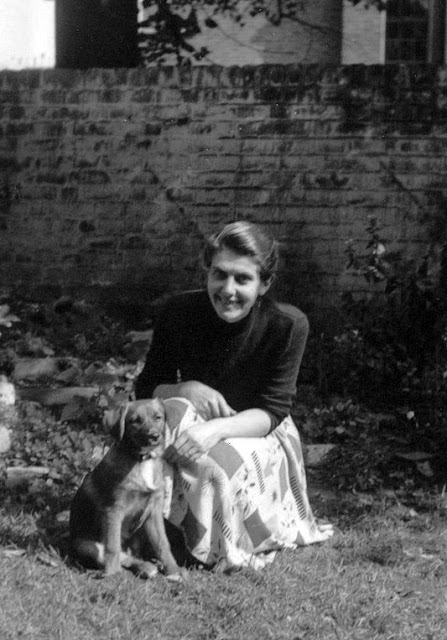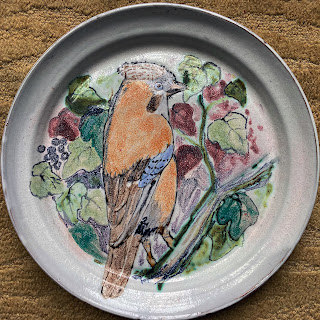98 not out!
 |
The Baker and McMullin families Putney, June 18th 2017 |
It is March 8th, 2023 and we are in Putney, south west London. My aunt, Eve, reclines on a sofa, a blanket across her knees. The room is full of vases of cut flowers. Cards are arranged on the mantelpiece and on the table. A large fish tank contains a silent chorus of colour, choreographed to spell out Happy Birthday in the imagination. The television lights a corner by the fireplace, subtitles misspelling the news. My cousin, Nick, brings a telephone to his mother: “It’s Mark….” Eve listens and speaks. Another cousin, Sarah, explains to me that this was Isobel (her long-departed sister)’s partner, who regularly keeps in touch.
 |
Eve at 98 |
My aunt, Eve, was born on March 8th 1925, in a bungalow on Arnakal tea estate, at Vanderperiyar, 3,000 feet up in the Cardamon Hills in Kerala, southern India. She was the third child of the family, my mother, Anna, being the second, just two years older. Robert had been the firstborn, in 1921, and Peter was to be the last, in 1927.
 |
Eve and Peter with their father, Major Robert McMullin Arnakal, India, 1933 |
Of these four, Eve is the survivor; all the others, including their partners, with the exception of Adrienne, Robert’s wife, who was born in 1934 and who lives in Toronto, Canada, have now passed on.
 |
Peter and Eve, Arnakal |
None of this will matter to anyone outside our family circle. Indeed, it doesn’t matter much at all, but I am happy my aunt survives and I celebrate the warmth of relationships. If we turn our back on our nearest, then how can we care for others? And this human world is bad enough without any further loss of love.
Eve’s life is to be celebrated. It isn’t over, yet, but it has run a fine course, bringing light and life to others. And it is remarkable how alive some of Eve’s memories still are. In the course of my brief stay that morning we talked about her mother, who I did just know when I was little, and about coming to England as a child, and going to school, with her sister, my mother. She even recalled the name of the school, Storrington, in Eastbourne, where the two of them were boarders.
 |
Eve and Anna, c 1938? |
After their father had brought the family home from India, he set up a Silver Fox farm at Robertsbridge, in Sussex, and the two girls would make their way by train to the school in Essex. On the way through London, Eve still recalls, they might pass a little time at the newsreel cinema (I think I remember them as Jaceys, showing Pathe News) in one of the rail termini in the city. I know this to be true as my mother also told me this years ago, but it is remarkable that such experience is still there to be related in Eve’s mind, and she cannot have been much more than eleven at the time, some 85 years ago.
 |
Eve at Pean's Farm |
 |
Peter and Eve, c 1941 |
Yes, Eve was literate, and an integral part of her life was a writers’ group, which she organised, and she was an artist, and became an excellent potter, producing beautiful glazed ceramic plates, cups, jugs and bowls some of which are still among my treasured possessions. For years she exhibited annually with a friend and had her own kiln.
 |
One of Eve's creations |
For all her immediate family, the Second World War interrupted their lives and the four young people served in various ways. Although she was only 14 when the war broke out, Eve spent time after leaving school (which she remembers was evacuated to Devon) in the WAAF, as my mother did. Then, after the war was over, she met Wilfred Baker, a friend of her brother Peter from University, and in the summer of 1951, they married.
 |
Eve and their lovely Tansy c late '50s |
Wilfred was a businessman, and developed an import/export business in optical equipment. For many years this was successful and their life together moved from a modest house (whose basement rooms flooded in heavy rain) in Holland Park, to a more substantial house near Portobello Road, to a fine big house in Putney, where I joined the family for a while as their interior decorator. They also had a holiday cottage in Mayo, not far from a branch of our Irish family who lived in Westport (the McMullin family had had property in Sligo, but this is now lost).
 |
Eve and Wilfred on their Golden Wedding, 2016 |
There were five children, three girls and two boys, and there was always a buzz about the place. I had grown up with two brothers, and I enjoyed staying with my cousins. I also enjoyed going for drinks with Wilfred, sometimes at the Grapes near Aldgate, where he had an office, sometimes at Gordon’s Wine Bar near Embankment Gardens, and more often at the Spread Eagle in Wandsworth. Wilfred was excellent company, even though he quite often forgot to carry cash....
The house was alive, and there were always people coming and going. The children had their talents, with Isobel taking after her father as a serious pianist. Chris was a fine artist, and was for a time one of the original puppet makers for Spitting Image. Sarah went from a teaching degree to work for the National Theatre, before moving to Italy as a professional artist. Jenny was, and is, a great cook and Nick developed his skills as a carpenter.
Unfortunately, however, Wilfred’s business partner let him down, and they had to downsize, twice, over the years when he should have been able to retire comfortably. Separately he developed Vascular Dementia, and at his death in 2017, Eve had to manage some difficult finances, but, as ever, she carried on, keeping her head, as she had done earlier when Isobel died, and later when Chris passed away.
Taking in lodgers, and keeping a tight hold on the purse strings, Eve came through, and she was always warm and welcoming whenever I visited her. And she was full of reminiscences and her bright memory shone to illuminate my interests in family history. Even now, today, her 98th birthday, she remembers her mother, who was private secretary to Anna Pavlova in London before her marriage, and corrects me on details from a lifetime ago.
 |
Eve and Anna's last meeting |
Although she is weak and thin now, and depends on social workers, family and lodgers a great deal, her voice is still clear, with an unaffected accent that I believe carries a hint of Ireland and a touch of India and which breaks into a smiling laugh every now and then. Old age can be a terrible thing, but Eve is weathering that storm, for now, and she gives hope to those who feel old before their time. She engages with people and with life and always has done. I left as Lauren, one of her eight grandchildren, arrived to pay her respects (and there are also three great grandchildren, so far....)
Succeeding generations will remember Eve with great affection, love and gratitude for the part she has played in all our lives. She did need to be reminded that it was her 98th birthday, and then she chuckled as if she didn’t quite believe it......




















